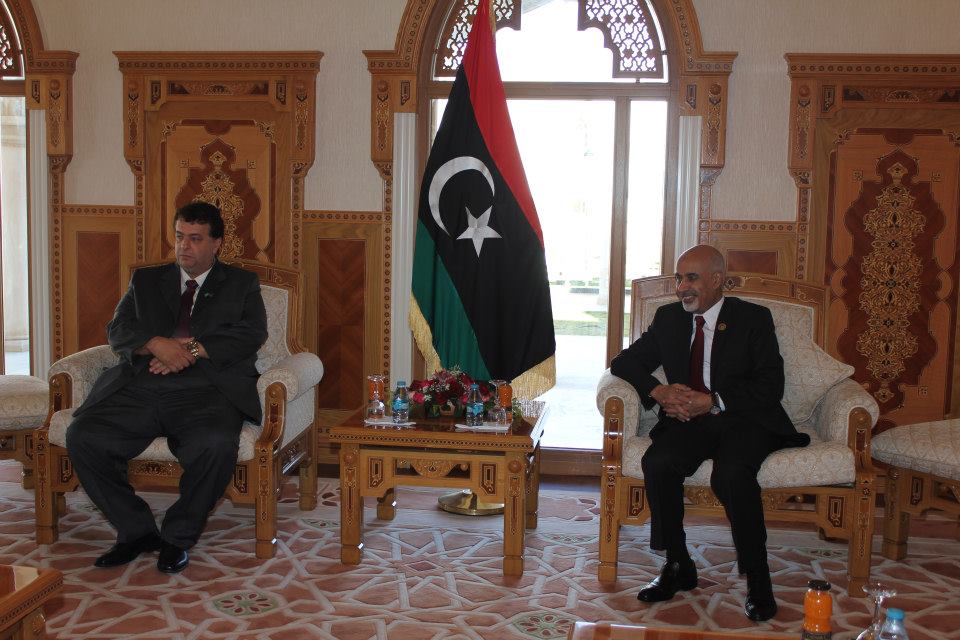By Michel Cousins.

Tripoli, 15 December:
Brazilian Congressman Adrian Mussi Ramos, has had talks with President of the General National Congress (GNC) Mohamed . . .[restrict]Magarief about strengthening Brazilian-Libyan ties and his country helping with Libyan constitutional development. He has also met with Oil Minister Abdelbari Al-Arusi.
Tomorrow, Sunday, he is due to meet with Third Deputy Prime Minister Abdussalam Al-Qadi, the Economy Minister Mustafa Mohammed Abufunas and the Minister of Youth and Sports, Abdulsalam Abdullah Guaila.
Adrian, as he is usually known in Brazil, arrived in Libya on Wednesday in an official capacity, representing the Brazilian Congress. It was his first visit and the first official Brazilian one to Libya since the revolution.
As a result of it, the GNC has been invited to send a delegation of 15 members to Brazil to see how the Brazilian congress and constitution work. The visit is being organised with the help of Ain Zara’s independent congressmen, Mahmoud Tabib and Abdul Naser Aseklani. It would go “as soon as possible”, Adrian says.
He hopes that, as a result of his visit and the growing relations between the two countries, a Libyan-Brazilian parliamentary association can be formed at some point in the future.
His talks with GNC members also touched on ways Brazil could help with job creation in Libya, economic cooperation, assistance to small entrepreneurs, agricultural development, training young people and vocational training. “We are willing to bring experts in certain fields to assist in Libyan development.”
He says that he himself will be going back to Brazil “to convey the message to President Dilma Rousseff, to Vice President Michel Temer, to Foreign Minister Antonio Patriota and to the House of Representative and the Chamber of Deputies that Brazil needs to foster relations with Libya, to strengthen technical relations and humanitarian assistance and work in partnership for the construction of the new Libya”.
Speaking to the Libya Herald today, Saturday, Adrian explained that his interest in Libya was sparked by his acquaintance with Mohamed El-Zway, president of the Libyan-Brazilian Friendship and Cooperation Association. It has offices in Sao Paulo, where Zway has been based for the past 25 years, and in Benghazi, his home city.
“Mohamed asked me to help [when the revolution started] because of his concerns about the country and the situation in Benghazi.” A member of the Brazilian Congress’ lower Chamber of Deputies, Adrian uses an powerful metaphor to explain what has now become a abiding interest in Libya. “I became infected with his concern; it was like a virus.” As a result he created last spring the Brazilian-Libyan Parliamentary Friendship Group.
It was a virus in part developed by his passionate hatred of dictatorships, no matter where in the world. He speaks about Brazil’s own dictatorship and how once the country broke with it in 1985 it managed to grow and prosper. “From the moment Brazil decided to establish democracy and embrace liberty of expression of the people and the media, the country’s leadership became obliged to govern on behalf of the people.” The country, as a result, transformed itself into one the world’s major economies. He thinks that there could be lessons for Libya and firmly believes the same economic explosion could happen here.
“I think, I believe, I’m sure that Libya, although different, has the same potential as Brazil. I’m convinced that it will manage to become among the biggest economies in the world,” he says. “I believe greatly in the future of this country.” [/restrict]








